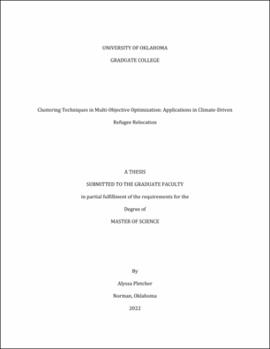| dc.description.abstract | As climate change becomes increasingly concerning around the world, and with large uncertainty falling on the aspects of displaced people, a need for planning is prevalent. This complex problem—of which there is little to no preparation for—will require a comprehensive look into the different layers of the pathways to resettlement. The current process for refugee resettlement is not suitable for the prospective increase in the number of displaced people due climate related incidents, nor does it consider climate resettlement apart of the growing refugee population at the time. As this problem has proven to be laborious and extensive in the number of attributes to be considered, the goal of this study is to expand on a developing multi-objective optimization (MOO) problem by displaying how applying clustering methods can be beneficial to a resettlement plan for decision-makers. By applying k-medoids clustering (PAM) to host locations, the proposed addition aims neutralize some of the error in the arduous resettlement plan, provides the ability to adjust the granularity of focus, and takes a more practical look into an unknown, multi-faceted future. | en_US |
